Published 11 January 2023 ● Last Updated on 13 February 2023
The United Nations defines sustainable development as “meeting the needs of the present without compromising the ability of future generations to meet their own needs.” While audacious sustainability goals are all well and good, the world also needs a holistic, targeted series of small and consistently applied actions for lasting business and societal results.
Let’s look at some of the emerging trends in the sustainability space trying to do just that!
Net Zero Technology
Net Zero means to “balance greenhouse gas removal with greenhouse gas emissions so that the overall net emissions are zero”. To reduce emissions, we need to scale up removals as well as ensure cuts in emissions. In order for net zero to be effective, it must be permanent. Permanence means that removed greenhouse gases do not return to the atmosphere over time, for example through the destruction of forests or improper carbon storage.
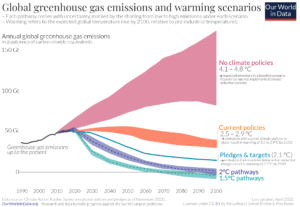
For the energy sector to be able to achieve net zero emissions, there needs to be a radical technological transformation. While energy efficiency and renewables are paramount, additional technology is needed to achieve net zero emissions. There are four pertinent technology value chains that can contribute about half of the cumulative emission savings – technologies to widely electrify end-use sectors (such as advanced batteries), carbon capture, utilisation and storage (CCUS); hydrogen and hydrogen-related fuels, and bioenergy.
Green Work Spaces
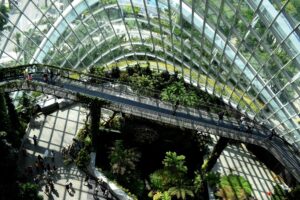
The pandemic and its aftermath have changed how the world works with hybrid workplaces. Though the pandemic has ebbed, companies have seen and felt the benefits of this model and continue to embrace it. Hybrid workplaces are the best thing that has happened to the planet as fewer people are travelling to and for work, resulting in lower emissions, a reduced carbon footprint, and thus allowing the planet to breathe a little better.
Another facet of work that has changed after the pandemic is events. Research shows that a three-day 1000 people event generates 523 tonnes of CO2, equivalent to burning 1233 barrels of oil. While in-person events have their advantages, the pandemic has shown us that immersive technology is creating opportunities for companies to embrace learning and training differently and collaboration technology is paving the way for virtual events that are indistinguishable from the real ones.
In addition, businesses are walking the extra mile to reduce their carbon footprint from embracing the Leadership in Energy and Environmental Design (LEED) standard — a globally recognized third-party metric- to integrating sustainability with everyday business operations by encouraging longer Product Life Cycles and limiting waste.
Transparency in Sustainability Reporting
According to the World Economic Forum’s Global Risk Report, environmental concerns dominate the top long-term risks among members of the World Economic Forum’s multi-stakeholder community. Environmental sustainability thus is no longer just a corporate social responsibility issue or a nice to have—it is a business imperative.
With expanded regulatory compliance and pressures from critical stakeholders, companies are realising that they must be transparent about sustainability efforts. It is expected that in 2023 and beyond more and more businesses will be held accountable for their carbon emissions. As a result, leading companies around the world are now committed to validating measured Environmental, Social and Governance (ESG) reporting, ESG performance, and reporting summarise the efforts and provide documented performance insights to make more holistic and sustainable decisions.
Tighter Regulations
Industries are under more intense scrutiny and scepticism than ever before given the many greenwashing headlines. Tighter regulations are being demanded to ensure greater efficacy in sustainable policies. For instance, ahead of COP15, Business for Nature’s Make it Mandatory campaign had more than 330 business and finance institutions from 56 countries calling for mandatory requirements for all large businesses and financial institutions to assess and disclose their impacts and dependencies on biodiversity by 2030.
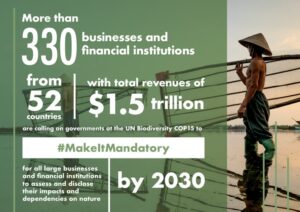
To avoid the most damaging effects of climate change, countries need to work together to limit pollution and keep global warming to under 1.5 degrees Celsius. But countries differ in their approaches towards environmental regulation. New research finds that companies that are the biggest contributors to CO2 emissions, emit less CO2 at home when domestic environmental regulations are strict. However, these companies also emit more abroad, particularly in countries with laxer environmental standards. Findings suggest that for progress to pick up, countries will have to take collective action and ensure tighter regulations across to bring down overall global emission levels further
Greener Delivery Modes
Online sales soared during the pandemic, and ever since there has been no looking back. This unexpected surge in sales has mooted the industry to look for more environmentally friendly delivery methods, making it a top sustainability trend for the future.
Through a recent Deloitte report, it is evident that consumers are moving towards eco-friendly products and services. However, as per the report, this trend goes beyond sustainability and includes measures aimed at improving working conditions and employee well-being.
There are some fantastic ideas that have already been put into practice in countries across the world. For instance, in Singapore and other southeast Asian countries, the ubiquitous GRAB delivery bikes, and last-mile logistics provided by e-cargo bikes from RYTLE in Germany. Flipkart and Ikea have made a move to ensure at least half of their last-mile delivery options are sustainable.
Climate Change and Political Will
An important step to reducing carbon emissions is government policy, yet there is a lacuna in political will for climate action. A crucial influence on the political system is engaged citizens who demand action.
With growing awareness of sustainability the world over and citizen movements demanding better action towards climate control, global warming, and other issues, it is imperative for government bodies to prioritise climate change action at the scale and speed in the coming years.
While eight countries in the world have already achieved net-zero status, India has made a commitment to achieve net zero emissions by 2070, China is looking at a 2060 deadline, and Singapore by 2050.
Image credit – ourworldindata
Ethical Supply Chain
With growing awareness about issues like climate change, sustainability, forced labour, and poor working conditions, consumers are demanding that supply chains meet ethical standards. Studies have shown that three-quarters of millennials are willing to pay more for sustainable goods.
In order to move towards an ethical supply chain there are many things that need to be attended to – simplifying processes; efficient planning; visibility into supplier actions, optimising transportation routes to reduce fuel consumption; monitoring environmental risks, and much more. From IoT sensors to blockchain, AI-driven bots, and advanced real-time analytics there are many advanced technological factors that play a big role in ethical supply chain management.
That said, the ethical supply chain is an evolving practice and there is clearly more work to be done that will unfold in the future.
Circular economy
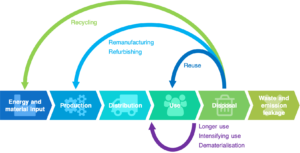
Linear economy give way, it’s time for circular economy to rule the roost.
Currently, only about 9% of the economy is circular and it is calculated that the opportunity to profit from the conversion of the remaining 91% sits at around $4.5 trillion. This means that circular economy is the biggest wave of business transformation that companies are embarking on since the industrial revolution. Companies willing to invest in a circular economy will be industry game-changers of the future.
Companies have already jumped on the circular economy bandwagon. Take for example Levis, This fast fashion brand has not only rejigged its image by taking on the tag, “buy better, wear longer”, but has also hosted a conference with its competitors to share the knowledge they had about water-saving best practices.
doTERRA, a brand that retails essential oils and allied products through multi-level marketing, has partnered with local farmers in over 40 countries across the world through a co-impact sourcing model. This ensures long-term, mutually beneficial supplier partnerships where skilled rural farmers oversee plants and growing environments, and doTERRA provides jobs.
Related Links
Solar Energy | Sembcorp has more than the Tengeh Floating Platform on its agenda

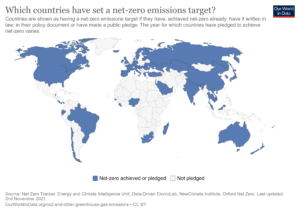


0 Comments